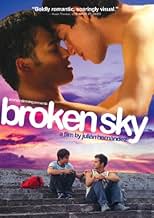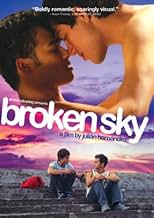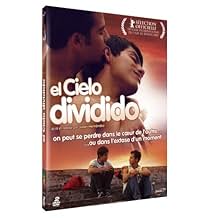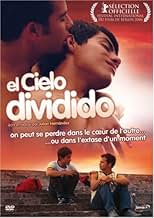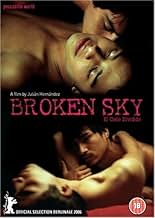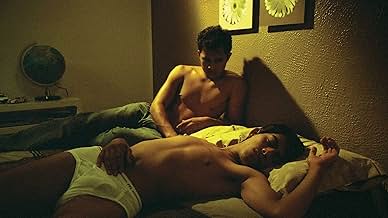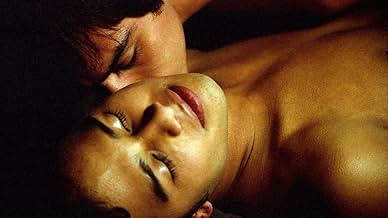AVALIAÇÃO DA IMDb
5,7/10
1,3 mil
SUA AVALIAÇÃO
Adicionar um enredo no seu idiomaTwo students, Gerardo and Jonas, are in love. However, Jonas becomes obsessed with another boy, which leads to Gerardo moving into arms of Sergio.Two students, Gerardo and Jonas, are in love. However, Jonas becomes obsessed with another boy, which leads to Gerardo moving into arms of Sergio.Two students, Gerardo and Jonas, are in love. However, Jonas becomes obsessed with another boy, which leads to Gerardo moving into arms of Sergio.
- Direção
- Roteirista
- Artistas
- Prêmios
- 2 vitórias no total
Clarisa Rendón
- María
- (as Clarissa Rendón)
Avaliações em destaque
Like João Pedro Rodrigues (Two Drifters), Mexican filmmaker Julián Hernández makes obsessively gay films unlike Almodóvar, whose outlook may be gay but who has achieved almost universal acceptance through his varied milieus, intricately amusing plots and use of women in prominent roles (not to mention his general brilliance as a filmmaker, which neither Rodrigues nor Hernández has yet established). Hernández's sphere is even more narrow than Rodrigues', but more emotionally accessible and less odd. Influences include Cocteau, Pasolini, Wong Kar Wai and the Duras/Resnais collaboration of' Hiroshima mon amour, a line from which is quoted as an epigraph. Unlike Rodrigues', this filmmaker's few characters are not oddballs or obsessives but simply prettier-than-average middle-class Mexico City young men oppressed by love-longing. Like Hernández's previous feature A Thousand Clouds of Peace (2003) in its preoccupations but with higher production values, the subject is a young man whose love object eludes him. Two female characters are barely more than glimpsed in passing. We're examining a gay love affair and nothing else. These are students, but don't ask what their majors are. They spend more time in discos than in classrooms.
As in the previous Hernández feature, plot and dialogue are minimized. There are voiceovers but the characters rarely speak. We get used to their miming their feelings. Gerardo (Miguel Angel Hoppe) picks up Jonas (Fernando Arroyo) in a playing field at the university and the passionate kisses and embraces and the sex begin right away. Then Jonas starts averting his face when Gerardo tries to caress or kiss him. And yet they're still regularly sleeping together. Gradually a third person enters the picture Sergio (Alejandro Rojo), a slightly older man, a tall, dark, brooding fellow, even easier on the eyes than the other two. He has already watched the pair play hide and seek in the library stacks when he was installing a light bulb. Sergio has wanted Gerardo for a long time, or so he says when they finally get together after one of several encounters in a gay-friendly club in this film, everywhere is gay friendly. Scenes take place either around the university, in the guy's rooms, or in a club; all problems other than love are minimized or eliminated. Except for some yellow filters, the photography is pretty, but straightforward. None of Wong Kar Wai's richly grungy pads here: the rooms are conventional middle-class housing, with tasteful prints on the walls and textbooks on the shelves, not palatial but posh for students' digs. The guys only have a few pairs of jeans, but they sure have lots of shirts.
The message that the film conveys and though it is too long, it's basic idea works; the scenes convey the desired feelings and the editing is seamless at first is that two people never seem to love each other at the same time to the same degree in the same way.
But the ending is a happy and romantic one. Once Sergio and Gerardo are a couple, Jonas begins to long for Gerardo again, and in the final scene, they've gotten back together.
Broken Sky is more like a poem or an opera or most of all, a dance than a conventional film. It's a different experience. The mainstream audience would never put up with all this gay sex without dialogue or plot. Not every gay man will have the patience to watch these amorous comings and goings for the full 140 minutes, either. I'm not sure that the poetic voiceovers were necessary; and a third of them are lost to non Spanish-speakers because the white-on-white subtitles are illegible. They are a bit too poetic and general. The boys are too specific to be so generalized by the language. Needless to say, "the real world" is beyond the range of Broken Sky. But there's no denying that Broken Sky in its own way is unique and beautiful. The director achieves what he was clumsily groping for in his first one. He is using cinematic language in a way that it rarely is any more he achieves the instinctive identification and emotional directness of the silent film. Broken Sky makes you think about the unspoken element in any relationship, the things that can never be communicated in words: in short, the world of eroticism and feelings. Hernández contributes to the effectiveness of his visual poem through excellent use of various musical accompaniments, a few notes on a clavicord, a string quartet above all, a sweet pop love song the lyrics of each lovingly translated in subtitles. It's as if Gerardo and Jonas were trying to live a pop song. And I guess that's what moony young gay guys do a lot of the time. There's even a coloratura operatic aria; considering the operatic tone of things, the filmmakers exercise great forbearance in using only one. Maybe this is "a new cinematic language," as was said of Antonioni's L'Avventura. For a while one can savor it, admire the naive sweetness of it. But can anyone read it? And can it say more than one thing?
As in the previous Hernández feature, plot and dialogue are minimized. There are voiceovers but the characters rarely speak. We get used to their miming their feelings. Gerardo (Miguel Angel Hoppe) picks up Jonas (Fernando Arroyo) in a playing field at the university and the passionate kisses and embraces and the sex begin right away. Then Jonas starts averting his face when Gerardo tries to caress or kiss him. And yet they're still regularly sleeping together. Gradually a third person enters the picture Sergio (Alejandro Rojo), a slightly older man, a tall, dark, brooding fellow, even easier on the eyes than the other two. He has already watched the pair play hide and seek in the library stacks when he was installing a light bulb. Sergio has wanted Gerardo for a long time, or so he says when they finally get together after one of several encounters in a gay-friendly club in this film, everywhere is gay friendly. Scenes take place either around the university, in the guy's rooms, or in a club; all problems other than love are minimized or eliminated. Except for some yellow filters, the photography is pretty, but straightforward. None of Wong Kar Wai's richly grungy pads here: the rooms are conventional middle-class housing, with tasteful prints on the walls and textbooks on the shelves, not palatial but posh for students' digs. The guys only have a few pairs of jeans, but they sure have lots of shirts.
The message that the film conveys and though it is too long, it's basic idea works; the scenes convey the desired feelings and the editing is seamless at first is that two people never seem to love each other at the same time to the same degree in the same way.
But the ending is a happy and romantic one. Once Sergio and Gerardo are a couple, Jonas begins to long for Gerardo again, and in the final scene, they've gotten back together.
Broken Sky is more like a poem or an opera or most of all, a dance than a conventional film. It's a different experience. The mainstream audience would never put up with all this gay sex without dialogue or plot. Not every gay man will have the patience to watch these amorous comings and goings for the full 140 minutes, either. I'm not sure that the poetic voiceovers were necessary; and a third of them are lost to non Spanish-speakers because the white-on-white subtitles are illegible. They are a bit too poetic and general. The boys are too specific to be so generalized by the language. Needless to say, "the real world" is beyond the range of Broken Sky. But there's no denying that Broken Sky in its own way is unique and beautiful. The director achieves what he was clumsily groping for in his first one. He is using cinematic language in a way that it rarely is any more he achieves the instinctive identification and emotional directness of the silent film. Broken Sky makes you think about the unspoken element in any relationship, the things that can never be communicated in words: in short, the world of eroticism and feelings. Hernández contributes to the effectiveness of his visual poem through excellent use of various musical accompaniments, a few notes on a clavicord, a string quartet above all, a sweet pop love song the lyrics of each lovingly translated in subtitles. It's as if Gerardo and Jonas were trying to live a pop song. And I guess that's what moony young gay guys do a lot of the time. There's even a coloratura operatic aria; considering the operatic tone of things, the filmmakers exercise great forbearance in using only one. Maybe this is "a new cinematic language," as was said of Antonioni's L'Avventura. For a while one can savor it, admire the naive sweetness of it. But can anyone read it? And can it say more than one thing?
10mansart
I guess it's not surprising that this film received mixed reviews. I knew when I saw it that it would not be for everyone. I have to say though that I really loved this film and would gladly see it again, particularly to share it with someone I care for.
I think you have to just sit back, relax and let this film wash over you. The best way for me to describe it is as a beautiful poem about love, particularly young love. It conveys all the thrill and excitement, the confusion and pain, the jealousy and longing...really all the emotions one experiences from first love. Rather than words, however, this poem is composed of pictures and music and ambient sound. Like a poem it isn't always straightforward, you don't always understand every moment, but the feelings that it evokes are strong and genuine, and it captures universals in a way that a more specific, narrative film never could.
The director has said that the reason there is so little dialogue is that the moments he chose to capture were the ones between the dialogue; before the characters felt the need to speak, and after they had said all there was to say. What's amazing is how illuminating those moments are when one chooses to pay attention to them.
In the context of this film I'm not sure what the phrase "gratuitous male nudity" means. Although I know it never happens in the U.S., in other countries people get naked. It's part of life. It's certainly part of the relationship that this film is all about, and to show it, unceremoniously, as part of the fabric of a life and a relationship can hardly be described as "gratuitous".
I guess the best compliment I can pay this film is to say that I am still thinking and talking about it, weeks after seeing it. The camera work, the composition, the use of sound and music, and the contribution of the young stars, all contribute to the film's success. If you enjoy film-making as an art form, I'd highly recommend you seek out this film.
I think you have to just sit back, relax and let this film wash over you. The best way for me to describe it is as a beautiful poem about love, particularly young love. It conveys all the thrill and excitement, the confusion and pain, the jealousy and longing...really all the emotions one experiences from first love. Rather than words, however, this poem is composed of pictures and music and ambient sound. Like a poem it isn't always straightforward, you don't always understand every moment, but the feelings that it evokes are strong and genuine, and it captures universals in a way that a more specific, narrative film never could.
The director has said that the reason there is so little dialogue is that the moments he chose to capture were the ones between the dialogue; before the characters felt the need to speak, and after they had said all there was to say. What's amazing is how illuminating those moments are when one chooses to pay attention to them.
In the context of this film I'm not sure what the phrase "gratuitous male nudity" means. Although I know it never happens in the U.S., in other countries people get naked. It's part of life. It's certainly part of the relationship that this film is all about, and to show it, unceremoniously, as part of the fabric of a life and a relationship can hardly be described as "gratuitous".
I guess the best compliment I can pay this film is to say that I am still thinking and talking about it, weeks after seeing it. The camera work, the composition, the use of sound and music, and the contribution of the young stars, all contribute to the film's success. If you enjoy film-making as an art form, I'd highly recommend you seek out this film.
The film is a bit tedious. It's mostly a silent film, with the bulk o the story provided through a series of voice-overs. While making a silent film like this is not such a bad idea, this is one of those films where the lack of dialog and the repetitive early scenes make it simply tedious. You don't understand the reason for the tedium until well into the picture, and by then it's too late. The first 40 minutes of film is something of a slow piece of Mexican soft porn, and unimaginative soft porn at that. Later in the film the style of the first 40 minutes starts to makes sense, but it's too late, because by then the audience is lost. There is some nice location shooting at the National Autonomous University of Mexico. I've often wondered why more films aren't shot there. The campus is built on the edge of lava fields that lend the campus a very otherworldly feel. My biggest problem with the film is that the director/writer has made the film the way he wanted to see it without regard for how a viewer who doesn't know the story will view it. You can't ignore the audience when you tell a story.
'El Cielo dividido' (BROKEN SKY) is a daring, experimental film from Mexican writer/director Julián Hernández and as such it is bound to polarize audiences. Some will fault the film for self-indulgence while others will praise the bravery of a film of this topic to come from a country not exactly known for its flexible social attitudes.
Julián Hernández focuses on the history of a first love and without using dialogue he tells his story simply with silent actors, minimal narrative comments which serve as program notes, music, and ravishingly beautiful photographic composition. Gerardo (Miguel Ángel Hoppe) opens the film, a solo youth wandering what appears to be the streets of Mexico City finally ending up in an open amphitheater where his eye glimpses another lone youth Jonas (Fernando Arroyo) sitting staring into space. Gerardo wanders over to him, sits beside him, gains the courage to touch his shoulder, Jonas responds glowingly - and love begins. Through the next scenes we find the couple making love both in bed and in unexpected public places including the stacks of the library of the school where they both are students -and where another pair of eyes enters: Sergio (Alejandro Rojo) watches longingly as Gerardo and Jonas kiss and display an aura of passion Sergio obviously longs for.
The new couple share many experiences, all bathed in love, until they eventually go to a disco: Jonas dances with an enchanted Bruno (Ignacio Pereda) and a trace of chemistry is generated, a fact that Gerardo, watching the boys dance, senses and is disturbed. A crack is created in their bliss and that crack only widens as they each have mixed responses to what they perceive is escaping. Gerardo encounters the winsome Sergio and the two bond physically, a fact that forces Jason to reevaluate his initial feelings for Gerardo.
All of this story is told without dialogue of words but with a very strong dialogue of eyes. Director Hernández seems to want to share how love is an internalized emotion, only demonstrated with physical intimacy, but fragile as a newborn in its vulnerability to wounds. Cinematographer Alejandro Cantú finds stunning settings and lighting and sensitive explorations of love making that never exceed tasteful states. His manner of showing time elapsing is to pan walls within a room that serve as flashbacks and flash-forwards as a means of carrying the story forward. Film editor Emiliano Arenales Osorio uses some very creative techniques to keep the viewer guessing as to whether we are observing fact, fantasy, present or past. And the musical score by Arturo Villela deftly maintains the minimalist stance with simple phrases by cello, harpsichord, and violin, saving the passion expression for the use of Dvorák in Rusalka's 'Song to the Moon' as ravishingly sung by Renée Fleming All of those praises being said, the major reason this film doesn't retain an audience base is its length: it is 140 minutes long, repetitive, and would have been much more powerful had it been cut to 90 minutes at best. It is far too visually stunning a piece of work to step beyond the patience of an audience happy to see the birth and blossoming and challenges of a first love between two beautiful young men. The actors are indeed a pleasure to watch, but in this case less is more. One wonders what Julián Hernández will create next. He deserves applause for this experimental film but hopefully will learn from its tendency toward self-indulgence. Grady Harp
Julián Hernández focuses on the history of a first love and without using dialogue he tells his story simply with silent actors, minimal narrative comments which serve as program notes, music, and ravishingly beautiful photographic composition. Gerardo (Miguel Ángel Hoppe) opens the film, a solo youth wandering what appears to be the streets of Mexico City finally ending up in an open amphitheater where his eye glimpses another lone youth Jonas (Fernando Arroyo) sitting staring into space. Gerardo wanders over to him, sits beside him, gains the courage to touch his shoulder, Jonas responds glowingly - and love begins. Through the next scenes we find the couple making love both in bed and in unexpected public places including the stacks of the library of the school where they both are students -and where another pair of eyes enters: Sergio (Alejandro Rojo) watches longingly as Gerardo and Jonas kiss and display an aura of passion Sergio obviously longs for.
The new couple share many experiences, all bathed in love, until they eventually go to a disco: Jonas dances with an enchanted Bruno (Ignacio Pereda) and a trace of chemistry is generated, a fact that Gerardo, watching the boys dance, senses and is disturbed. A crack is created in their bliss and that crack only widens as they each have mixed responses to what they perceive is escaping. Gerardo encounters the winsome Sergio and the two bond physically, a fact that forces Jason to reevaluate his initial feelings for Gerardo.
All of this story is told without dialogue of words but with a very strong dialogue of eyes. Director Hernández seems to want to share how love is an internalized emotion, only demonstrated with physical intimacy, but fragile as a newborn in its vulnerability to wounds. Cinematographer Alejandro Cantú finds stunning settings and lighting and sensitive explorations of love making that never exceed tasteful states. His manner of showing time elapsing is to pan walls within a room that serve as flashbacks and flash-forwards as a means of carrying the story forward. Film editor Emiliano Arenales Osorio uses some very creative techniques to keep the viewer guessing as to whether we are observing fact, fantasy, present or past. And the musical score by Arturo Villela deftly maintains the minimalist stance with simple phrases by cello, harpsichord, and violin, saving the passion expression for the use of Dvorák in Rusalka's 'Song to the Moon' as ravishingly sung by Renée Fleming All of those praises being said, the major reason this film doesn't retain an audience base is its length: it is 140 minutes long, repetitive, and would have been much more powerful had it been cut to 90 minutes at best. It is far too visually stunning a piece of work to step beyond the patience of an audience happy to see the birth and blossoming and challenges of a first love between two beautiful young men. The actors are indeed a pleasure to watch, but in this case less is more. One wonders what Julián Hernández will create next. He deserves applause for this experimental film but hopefully will learn from its tendency toward self-indulgence. Grady Harp
The unique film "Broken Sky" is an invitation to a different world, a quiet and dreamlike place where only love seems to hold any importance. The characters Gerardo and Jonas inhabit this private world, and no one else matters. Filmed in beautiful gold and brown shades, the two Mexican boys fall in love at first sight. The two are so in sync with each other that they barely need words to communicate their feelings. It seems things could not be more ideal for these two guys, until outside influences and doubt threaten to destroy their perfect, untainted love. "El Cielo Dividido" is not really a mainstream film; there is virtually no dialog, and the production moves along like a slow, hypnotic dance, rather than the typical fast pace of todays cinema. There has rarely been a film that so effectively creates it's own world, and it is a world filled with beauty and romance and sadness, a world that i personally was reluctant to leave at the film's end. Actors Miguel Angel Hoppe and Fernando Arroyo are both beautiful and utterly believable as the confused lovers, overwhelmed by intense feelings that are so new to them. Unique especially for "gay cinema" is this film's subtlety. The nudity and sexuality is not aggressively splashed across the screen to shock or titillate the viewer. It is simply there, and it is all a part of this private world of the two lovers. Best of all, "Broken sky" manages to recreate the feelings of first time love and sexual awakening like few films have managed. This is far from the typically flashy and garishly silly style of most gay films. Thankfully, there are no gay stereotypes to be found here; this is a film about love, and nothing more. "Broken Sky" is a unique and beautiful film.
Você sabia?
- ConexõesReferenced in Uma Família da Pesada: Road to Rupert (2007)
- Trilhas sonorasEn mi cielo
Written and performed by Volovan
By Arrangement with Universal Music Mexico
Principais escolhas
Faça login para avaliar e ver a lista de recomendações personalizadas
Detalhes
- Data de lançamento
- País de origem
- Centrais de atendimento oficiais
- Idioma
- Também conhecido como
- O Céu Dividido
- Locações de filme
- Empresas de produção
- Consulte mais créditos da empresa na IMDbPro
Bilheteria
- Faturamento bruto nos EUA e Canadá
- US$ 29.185
- Fim de semana de estreia nos EUA e Canadá
- US$ 4.956
- 1 de out. de 2006
- Faturamento bruto mundial
- US$ 160.445
- Tempo de duração2 horas 20 minutos
- Cor
- Mixagem de som
- Proporção
- 1.85 : 1
Contribua para esta página
Sugerir uma alteração ou adicionar conteúdo ausente

Principal brecha
By what name was El cielo dividido (2006) officially released in Canada in English?
Responda
